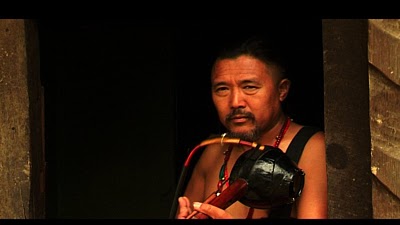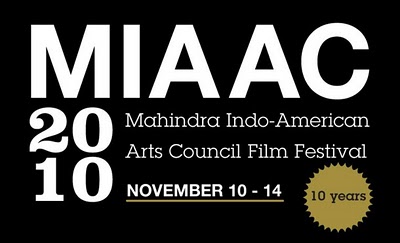
| Reviews |
| vevlynspen.blogspot.com MIAAC: One Man's Quest to Save the Music November 12, 2010 |
 "In Songs of Mashangva," Rewben Mashangva, above, has a musical message for his people that is chronicled in part by director Oinam Doren, below. Photos from Mahindra Indo-American Arts Council Film Festival. "In Songs of Mashangva," Rewben Mashangva, above, has a musical message for his people that is chronicled in part by director Oinam Doren, below. Photos from Mahindra Indo-American Arts Council Film Festival.AS you’re reading this article, Rewben Mashangva and his 9-year-old son, Saka, may be making their way to another village in northeast India to share some good news. With self-made instruments in tow, the blues musician and composer is essentially on tour playing oldies and goodies that many from his Tangkhul Naga tribe have all but forgotten. The musical genre is a form of folk that is almost 1,000 years old and was once upon a time fully integrated into the lives of the people in the hill region (Ukhrul district) of Manipur state on the border with Myanmar. In Songs of Mashangva, making its U.S. premiere at the 10 Annual Mahindra Indo-American Arts Council (MIAAC) Film Festival tonight, director Oinam Doren chronicles this fascinating story and the tragedy that informs it in his first feature-length film. “I instinctively made a connection with it [music],” OD explained via e-mail. “The sound was unique, something I have never heard of before and the lyrics was very local. I identify myself with the visual images the songlines connotes.”  In an article titled “My howling Mashangva experience,” writer Jyaneswar Laishram waxes nostalgic about the first time he saw the artist in concert: “… my maiden experience of his music at ‘Shared Solace’ was something else beyond what I expected from him. In fact, my knowledge of music is not mature enough to give proper appreciation of Mashangva’s songs. His music is perhaps a discovery of the finest facet of our homegrown tune which had been buried unnoticed for a long time.” (http://www.merinews.com/article/my-howling-mashangva-experience/15830375.shtml) In an article titled “My howling Mashangva experience,” writer Jyaneswar Laishram waxes nostalgic about the first time he saw the artist in concert: “… my maiden experience of his music at ‘Shared Solace’ was something else beyond what I expected from him. In fact, my knowledge of music is not mature enough to give proper appreciation of Mashangva’s songs. His music is perhaps a discovery of the finest facet of our homegrown tune which had been buried unnoticed for a long time.” (http://www.merinews.com/article/my-howling-mashangva-experience/15830375.shtml)It was at university that OD, who has worked in TV and is also a writer and photojournalist, first heard RM’s music. At the time he wanted to do something with his music but he did not know what just yet. “Over the years, Mashangva grew as a musician both in status and in form while I became a filmmaker. It is only when I met him, started interacting with him that I realized there is more to Mashangva's music other than just the unique sound or lyrics.” (http://www.youtube.com/watch?v=v2EbTsrSKs0) Part of what he realized was RM’s music preservation campaign. How is it possible, though, that such an ancient tradition can be facing extinction? Two words: Christian missionaries. It is the familiar, sad, sorry story of these “do-gooders” globetrotting, converting primitive pagans and heathens to the one true God, then massively overstepping the bounds of civilized behavior by denouncing ancient cultural traditions/institutions/mores as inferior and replacing them with self-described superior European alternatives.  “They [Tangkhul Nagas] have songs for every occasion – festival, seasons, work or everyday activities. For them it was a way of life,” said OD, who has observed that similar cultural practices are under threat in segments of his community, The Meiteis. “The songs also made the toils and labour of primitive life in the wild very pleasing.” “They [Tangkhul Nagas] have songs for every occasion – festival, seasons, work or everyday activities. For them it was a way of life,” said OD, who has observed that similar cultural practices are under threat in segments of his community, The Meiteis. “The songs also made the toils and labour of primitive life in the wild very pleasing.”In relatively few years however, dating to the late 19th century, the Rev.William Pettigrew&Co., set into motion a chain of events that today is making RM’s challenge a rather formidable one, and the plight of Tankhul Naga folk music is not part of UNESCO’s intangible cultural heritage campaign. (http://www.unesco.org/culture/ich/index.php?lg=en&pg=00002) The young generation favors gospel and rock, while the old generation is dying out, “so the fear is that after a few generations, the rich heritage will perish completely from the Tangkhul Naga society, said OD who is from the valley region of Manipur state. Coincidentally, his and RM’s regions are at odds with each other for reasons too complex to explain here. The two men, obviously, are not. Asked what he wants viewers to take away from “Songs of Mashangva,” OD said, “I wish my film garners enough supporters, partners, collaborators around the world for Rewben so that he succeeds in his mission. Otherwise I don’t see any future for him, as well as this rich primitive art.” Visit http://miaacfilmfest.org/index.htm for tickets, venues, show times and general information about the “10th Annual Mahindra Indo-American Arts Council Film Festival. |
| Source: http://vevlynspen.blogspot.com/2010/11/miaac-one-mans-quest-to-save-music.html |